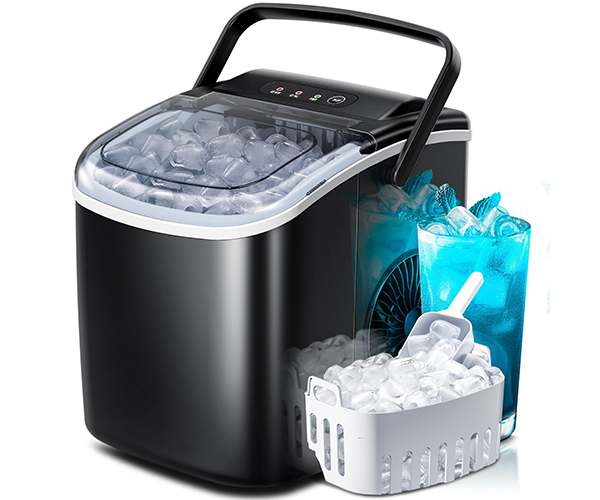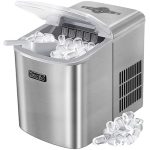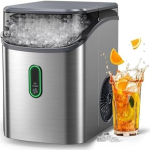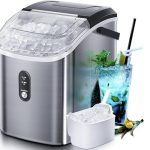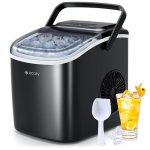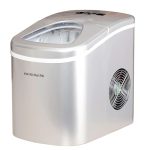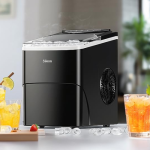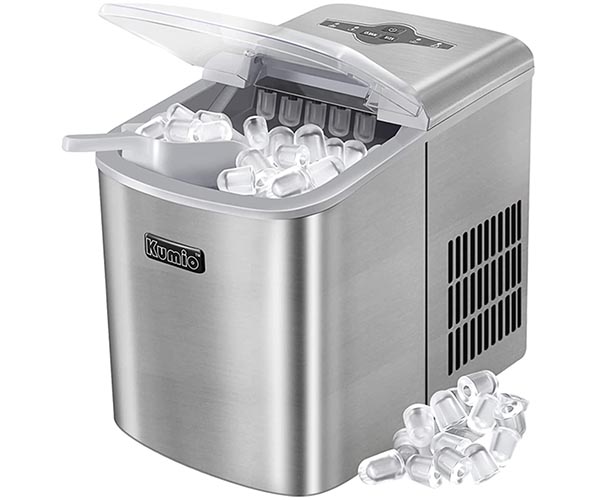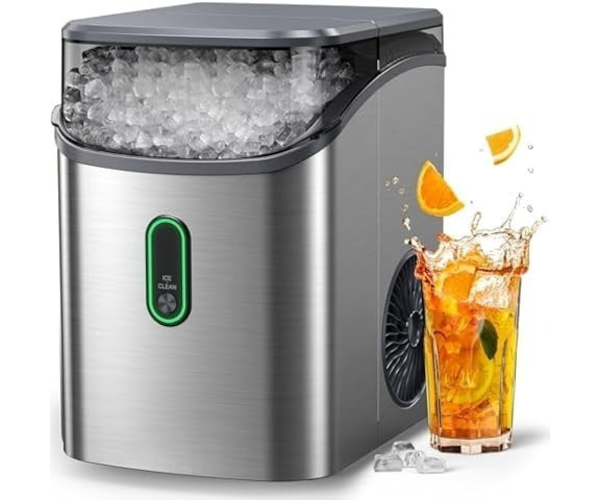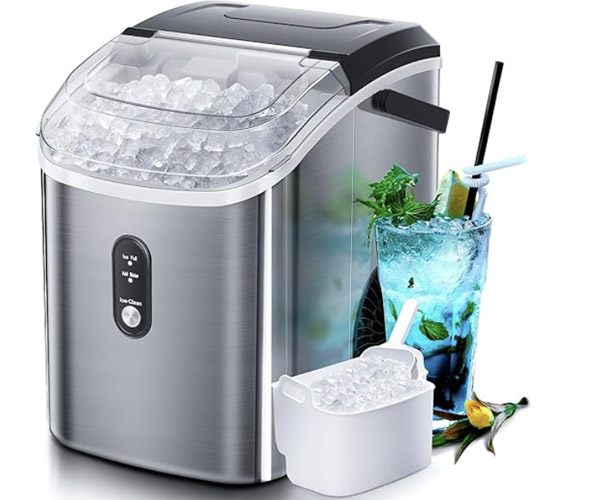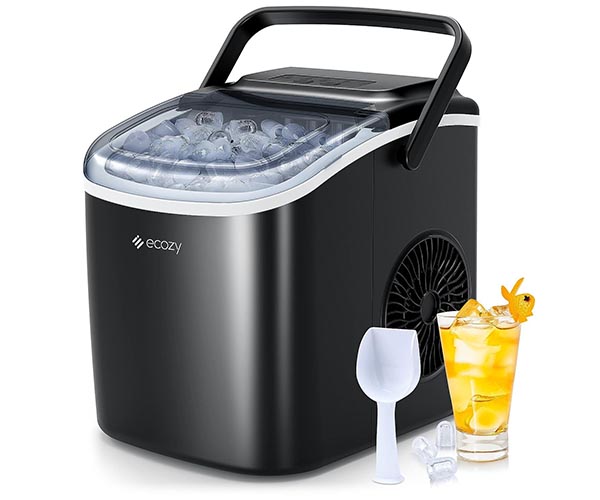Introduction
Nothing can be more frustrating than an ice machine that refuses to do its one job: make ice. Whether you’re planning a party or just need to cool down your drink, an ice machine hiccup can disrupt your day. But what if the culprit is as fundamental as your water supply? In this article, we explore how a faulty water supply can be the hidden antagonist in this chilly tale, drawing on personal experiences and industry insights to guide you through understanding and solving the issue. https://amzn.to/3WoePQf
Understanding Your Ice Machine
When dealing with an ice machine running but not making ice, it’s crucial to start with the basics of how these machines function. Here’s a deeper look into the mechanics and how they are impacted by the water supply:
- Basic Mechanics of an Ice Machine:
- An ice machine primarily consists of a water inlet valve, an evaporator plate, and a refrigeration system. The process begins when water enters the machine, gets cooled by the refrigeration unit, and is then frozen into ice by the evaporator.
- It’s a seamless process, but when the ice machine is running but not making ice, something is interrupting this flow.
- Impact of Water Supply on Functionality:
- Water Flow: Adequate water flow is essential. If the water inlet valve is faulty or the water pressure is too low, the machine can’t produce ice efficiently.
- Temperature and Quality: The temperature and purity of the water also play critical roles. Overly warm or contaminated water will not freeze properly and can lead to maintenance issues.
- Signs of Water Supply Issues:
- Irregular Ice Formation: When ice appears thin or incomplete, it’s often a sign that the water flow into the machine is insufficient.
- No Ice Production: The most glaring sign is when the machine runs, but no ice is produced. This can be due to a complete halt in water supply or severe contamination.
- Unusual Sounds: Gurgling or hissing sounds can indicate air in the lines or problems with the water valve.
By understanding these basic principles and signs of trouble, you can begin to troubleshoot the most common problems related to a faulty water supply in ice machines. Ensuring that your machine has a consistent and clean water supply is crucial for optimal performance and longevity.

Common Water Supply Problems
When your ice machine is running but not making ice, it’s crucial to scrutinize the water supply for potential issues that might be impacting its functionality. Here’s what to look out for:
- Insufficient Water Flow: A key symptom of insufficient water flow is when the machine seems to be operating, but the ice tray remains barren.
- Low water pressure could be due to a kinked supply line or a partially closed valve.
- Periodically check the water inlet valve and ensure it’s fully open and free from obstructions.
- Contaminated Water Supply:
- Minerals or sediment in the water can clog filters and reduce the quality and quantity of ice produced. This is particularly common in areas with hard water.
- Regularly replacing water filters and installing a water softener can mitigate this issue.
- Mechanical Failures:
- Blocked filters or malfunctioning valves are often the culprits behind a faulty water supply to your ice machine.
- Inspect and clean the filters every six months or more frequently if you notice a decline in ice production.
Understanding and addressing these common water supply issues can greatly enhance the efficiency of your ice machine, ensuring you never have to deal with a lack of ice at crucial moments.
Diagnostic Steps
If your countertop ice maker won’t make ice, it could point to issues with your water supply. Here’s how to assess and address potential problems that may be affecting your appliance’s functionality:
- Check Water Flow to the Ice Maker
- Ensure that the water supply line is fully open and not kinked or blocked, which can restrict the flow necessary for ice production.
- Inspect the inlet valve for any signs of wear or damage. A faulty valve can hinder the water flow to your ice maker.
- Water Quality Test
- Conduct a basic water hardness test to determine if excessive minerals might be clogging your ice machine. Hard water is a common cause for buildup in pipes and filters.
- Look for signs of sediment or unusual color in your water, which could indicate contamination affecting both the taste and the mechanical functionality of your ice machine.
- Cleaning and Replacing Filters
- Regularly clean or replace the water filters as per the manufacturer’s guidelines. Clogged or dirty filters are often the culprit behind insufficient ice production.
- If your model has a self-cleaning cycle, run it to clear out any mineral deposits or buildup within the machine itself.
- Inspect and Clean Water Lines and Valves
- Disconnect the water lines from the back of the ice maker to clean any debris or buildup that might be blocking the flow.
- If you find any malfunctions in the water inlet valve, consider replacing it to ensure optimal performance of your ice machine.
- Adjusting Water Pressure
- Ice machines typically require a specific range of water pressure to function correctly. Too low or too high pressure can prevent proper ice formation.
- Use a pressure gauge to check the water pressure in your lines. Adjustments might be necessary to meet the manufacturer’s recommended settings.
By following these steps, you should be able to diagnose and potentially solve issues related to a faulty water supply in your ice machine. Always remember that regular maintenance is key to the longevity and effectiveness of your appliance. If these steps do not resolve the issue, it may be time to consult a professional for a more in-depth examination.
Fixing Water Supply Issues
When your countertop ice maker won’t make ice, troubleshooting the water supply is a crucial step. Often, simple adjustments or minor repairs can restore your ice maker’s functionality. Here’s a detailed guide on how to address common water supply issues that might be affecting your ice machine:
- Inspect Water Lines for Kinks or Leaks
- Check all water hoses connected to your ice maker for any signs of kinks or leaks. A kink in the line can restrict water flow, while leaks can reduce the pressure that is necessary for ice production.
- If you find a kink, carefully straighten the hose to eliminate any blockages. For leaks, replace the damaged hose immediately.
- Evaluate the Water Inlet Valve
- The water inlet valve is crucial for controlling the flow of water into your ice maker. If this valve is defective or poorly adjusted, it could be the reason your ice maker isn’t making ice.
- Test the valve’s function by observing its operation as the ice maker runs. Listen for any unusual noises that might indicate a malfunction.
- Clean or Replace the Filter
- A clogged filter can obstruct water flow to your ice maker, preventing it from producing ice. Regular cleaning or replacing of the ice maker’s filter is essential for optimal performance.
- Remove the filter according to the manufacturer’s instructions, inspect it for debris, and clean or replace it as needed.
- Check for Adequate Water Pressure
- Ensure that your ice maker is receiving sufficient water pressure to function properly. Low water pressure can hinder the machine’s ability to produce ice.
- You can measure water pressure using a pressure gauge at a faucet close to the ice maker. The required pressure for most ice makers is typically between 40 and 60 psi.
- Flush the Water System
- Over time, impurities can build up in the water system, affecting both ice quality and production. Flushing the system helps remove these impurities and restores proper water flow.
- Disconnect the water supply and let water run through the system for a few minutes to clear out any accumulated sediments and impurities.
By following these steps, you can often solve the problem of a countertop ice maker that won’t make ice due to water supply issues. If these steps don’t resolve the problem, it might be time to consult with a professional. Regular maintenance and prompt attention to changes in your ice maker’s performance can prevent future issues and ensure you always have plenty of ice on hand.
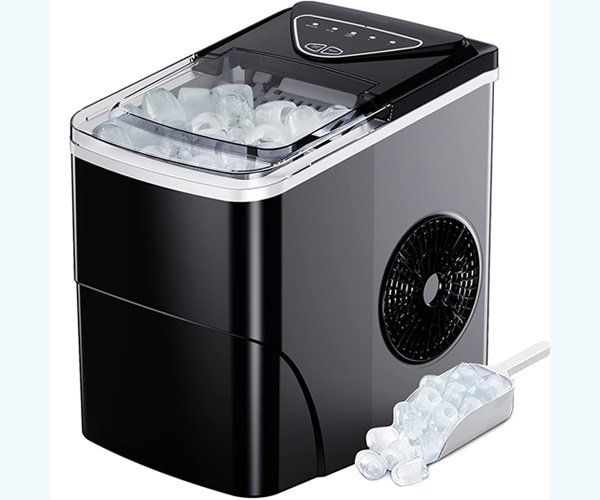
Enhancing Your Ice Machine’s Performance
Improving the performance of your ice machine not only ensures a consistent supply of ice but also extends the lifespan of your device. Especially when dealing with a countertop ice maker not freezing, there are several strategies you can employ to enhance its efficiency and effectiveness. Here’s how you can get the most out of your ice machine:
- Regular Maintenance Checks: Regularly inspect your ice machine for any signs of wear or issues that could hinder its performance. This proactive approach helps catch problems before they escalate.
- Optimize Water Quality: The purity and hardness of the water can significantly impact the performance of your ice machine. Consider installing a water filtration system to remove impurities and ensure that your machine is using the cleanest water possible.
- Adjust Freezing Settings: If your countertop ice maker is not freezing, adjusting the thermostat or control settings might be necessary. Sometimes, the environment or the usage pattern may require a different setting for optimal performance.
- Air Flow Optimization: Ensure that your ice machine has adequate ventilation. Poor airflow can lead to higher operating temperatures, which can impede the freezing process and affect ice quality.
- Regular Cleaning: Buildup of minerals and other deposits can affect the efficiency of your ice machine. Regular cleaning of the water lines, filters, and reservoirs can help maintain its performance and prevent issues like not freezing properly.
- Upgrade Parts When Necessary: Over time, parts like water filters, pumps, and motors might need replacements. Upgrading to high-quality components can enhance performance and reliability.
- Use of Automatic Cleaning Cycles: If your machine is equipped with this feature, make regular use of automatic cleaning cycles to keep the system clean and functioning properly without manual intervention.
By following these steps, you can ensure that your countertop ice maker not freezing issue is resolved and that the machine performs at its best. Regular maintenance, proper cleaning, and the occasional upgrade can go a long way in enhancing the efficiency and longevity of your ice machine.
Case Studies and Success Stories
Exploring how others have tackled issues with their ice machines can provide both inspiration and practical advice. Below are several case studies where addressing water supply problems led to significant improvements in ice machine performance, particularly for those pesky countertop ice makers not freezing.
- Local Cafe Overcomes Ice Machine Woes:
A popular local cafe faced recurring issues with their countertop ice maker not freezing properly. Upon inspection, it was found that low water pressure was hampering the ice-making process.- Outcome: After installing a water pressure booster, their ice maker resumed normal operation, producing full batches of ice consistently.
- Key Takeaway: Ensuring adequate water pressure can resolve freezing issues.
- Home Bartender’s Victory:
An avid home mixologist noticed their ice machine was running but not producing ice. Suspecting a water supply issue, they checked the machine’s filter and found it heavily clogged with mineral deposits.- Outcome: Replacing the filter and regularly descaling the system restored the ice machine to its full functionality.
- Key Takeaway: Regular maintenance is crucial, especially in areas with hard water.
- Event Planner’s Ice Machine Save:
During a major event, the ice machine stopped freezing, causing a potential disaster. A quick check revealed a kink in the water supply line.- Outcome: Adjusting the line and ensuring it was secure and free from bends allowed the machine to start freezing again, just in time for the event.
- Key Takeaway: Regular checks for physical anomalies in the water supply line are essential.
- Restaurant Chain Implements System-Wide Fixes:
A regional restaurant chain was experiencing inconsistent ice production across several locations. After a comprehensive audit, it was found that varying water quality was affecting the machines’ performance.- Outcome: The chain implemented a standardized water filtration system across all locations, which led to uniform ice quality and machine reliability.
- Key Takeaway: Consistent water treatment can prevent widespread issues in businesses with multiple units.
Each of these stories not only highlights the importance of addressing water supply issues but also showcases that often, the solution is simpler than expected. Whether it’s boosting water pressure, conducting regular maintenance, ensuring installation quality, or standardizing water treatment, the right approach can dramatically enhance the performance of your ice machine. https://amzn.to/3WoePQf
Conclusion
As we come to the end of our comprehensive tutorial on troubleshooting ice machines, particularly in situations when the primary issue is that the countertop ice maker is not freezing, it is essential to have a solid understanding of the significance of ensuring that a reliable water supply is maintained. Your voyage through the mechanics of ice machines and the fundamental methods to identify and remedy water-related issues should leave you well-equipped to ensure that your appliance is operating at its highest possible level of efficiency. It is important to note the following:
- Regular Maintenance: Regular checks and maintenance of your water supply system can prevent many problems before they affect your ice machine’s performance.
- Professional Advice: When in doubt, consulting with a professional can save you time and prevent potential damage to your ice maker.
- Community Learning: Sharing your experiences and solutions with others can help build a supportive community of informed users.
It is important to keep in mind that a well operating ice machine not only provides the benefit of having ice available whenever it is needed, but it also reflects the physical condition of the water supply system in your home. Considering that your countertop ice maker is not freezing, you should take this as a sign that you need to explore and possibly learn more about the functioning of the systems in your home.

FAQs about Ice Machine Running But Not Making Ice
- Why is my ice machine running but not producing ice?
- There could be several reasons including low water flow, clogged filters, or freezer temperature settings that are too high. It’s important to diagnose whether it’s a water supply issue or a mechanical problem.
- What should I check first if my ice machine isn’t making ice?
- Start by checking the water supply line for any kinks or leaks. Ensure that the water filter isn’t clogged and that the water inlet valve is functioning properly.
- Could temperature settings affect my ice machine’s performance?
- Yes, if the freezer temperature is set too high, the ice machine won’t freeze the water efficiently. Ensure the temperature is set to the manufacturer’s recommended settings.
- What are the signs of a clogged water filter in an ice machine?
- Reduced water flow to the ice maker, smaller than usual ice cubes, or no ice production are common signs that the water filter may need to be replaced.
- How often should I clean my ice machine to keep it running properly?
- It’s recommended to clean the ice machine every six months to prevent scale buildup and maintain optimal performance.
- Can a faulty door seal cause my ice machine to stop making ice?
- Yes, if the freezer door isn’t sealing properly, it can cause frost buildup around the evaporator coils, affecting the ice production.
- What steps can I take if my ice machine’s water supply seems fine but it’s still not making ice?
- Check the evaporator coils for frost buildup and ensure the ice mold thermostat is working correctly. If the thermostat is defective, it won’t trigger the ice-making cycle.
- Is it worth repairing an old ice machine that stops making ice, or should I consider replacing it?
- This depends on the age and condition of the ice machine. If repairs are frequent or costly, it might be more economical to replace the unit with a more efficient model.

